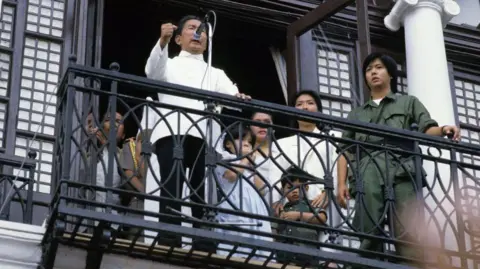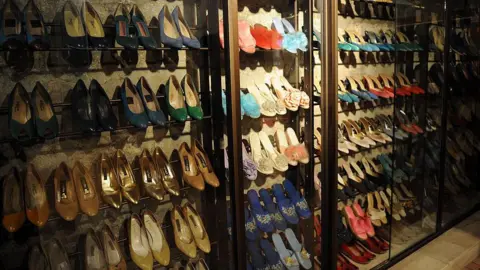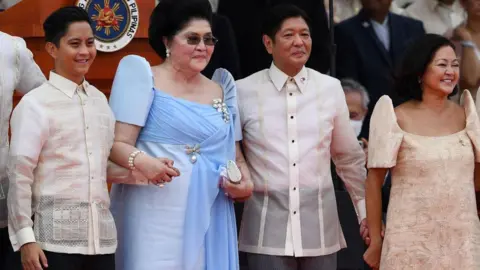 Getty Images
Getty ImagesPhilippine President Ferdinand Marcos Jr, commonly known by his nickname Bongbong, has been gearing up for a battle that could decide his political future.
Monday’s midterm elections are, in effect, a showdown between Marcos and his Vice-President Sara Duterte, daughter of former president Rodrigo Duterte.
The pair, who each represent the country’s most powerful families, won the 2022 election together – but their alliance has since collapsed.
They are now fighting for control of the senate, which would give Marcos the power to impeach Sara, and give Sara protection from such a move.
It’s a test for the presidency of 67-year-old Marcos, the son of an ousted dictator who rebranded his father’s turbulent reign to make a startling comeback in the 2022 election.
‘Destined’ for leadership
Born in 1957 to Ferdinand and Imelda Marcos, Bongbong was just eight years old when his father became president. He was the second of three children, and the only biological son. The couple later adopted a boy.
Bongbong’s father, a former lawyer, served in the Congress and Senate, while his mother was a singer and former beauty pageant winner. Both would achieve notoriety – as the family amassed enormous wealth under a brutal regime, they became synonymous with excess and corruption.
During his first term between 1965 and 1969, Ferdinand Marcos Sr was fairly popular, and was re-elected by a landslide. But in 1972, a year before his second term was due to end, he declared martial law.
What followed was more than a decade of dictatorship, during which the country’s foreign debt grew, prices soared and ordinary Filipinos struggled to make ends meet. It was also a period of repression as opposition figures and critics were jailed, disappeared or killed.
Through it all, Marcos Sr was grooming his son for leadership.
Bongbong’s childhood bedroom in llocos Norte, the family’s stronghold in the north, which is now a museum, has a portrait of him wearing a golden crown and riding a white stallion.
But the elder Marcos was also worried about whether his son would step up to the role. A diary entry from 1972 read: “Bongbong is our principal worry. He is too carefree and lazy”.
 Getty Images
Getty ImagesMarcos enrolled in Oxford University to study Philosophy, Politics and Economics, but it was later revealed that he did not graduate with a bachelor’s degree as he claimed.
Oxford said in 2021 that he was awarded a special diploma in social studies in 1978. That too, local media reports alleged, was the result of lobbying by Philippine diplomats in the UK after Marcos Jr failed his exams.
He returned home and joined politics, becoming the vice-governor and then governor of Ilocos Norte.
But the political career his parents had envisioned for him would be cut short by a revolution in 1986.
An economic crisis had already triggered unrest – but the assassination of a prominent opposition leader brought tens of thousands onto the streets.
A sustained campaign eventually convinced a significant faction of the army to withdraw its support for the Marcos regime, and hastened its downfall.
 Getty Images
Getty ImagesThe family fled to Hawaii with whatever valuables they could bring, but left behind enough proof of the lavish lives they had led.
Protesters who stormed the presidential palace found fanciful oil portraits of the family, a jacuzzi with gold-plated fixtures and the now-infamous 3,000 pairs of designer shoes owned by Imelda Marcos.
The family is accused of plundering an estimated $10bn of public money while in power. By the time Marcos Sr died in exile in 1989, his was a tarnished name.
And yet, some three decades later, his son was able to whitewash that past enough to win the presidential election.
Becoming president
After they returned to the Philippines in the 1990s, Marcos became a provincial governor, congressman and senator, before running – and winning – the presidential race in 2022.
Social media was a big part of this rebranding, winning Marcos new supporters – especially among the younger generation in a country where the median age is around 25.
On Facebook, the Marcos family legacy has been rewritten, with propaganda posts claiming that Marcos Sr’s regime was actually a “golden period” for the country.
On TikTok, a martial law anthem from the Marcos Sr era became the soundtrack to a cute challenge for Gen Z users, who would record older family members marching to the beat.
As his popularity grew, Marcos launched his presidential bid with Sara Duterte running for vice-president. She vowed to work with Bongbong to unify the country and make it “rise again”.
They called themselves the “uniTeam”, and combined the two families’ powerful bases: the Dutertes in the south, and the Marcos’s in the north.
 Getty Images
Getty ImagesIt paid off. Marcos won by a thumping 31 million votes, more than double the total of his closest rival.
“Judge me not by my ancestors, but by my actions,” Marcos said as victory became apparent, vowing to “be a president for all Filipinos”.
Three years into his presidency, Marcos has brought Manila closer to the US and increasingly confronted an assertive China in the South China Sea – a key departure from Duterte’s presidency.
That wasn’t the only thing that caused a crack in his alliance with Sara Duterte, which eventually descended into an ugly, public spat.
He gave her the Education portfolio, when she had openly sought the more powerful Defence portfolio. He initiated impeachment proceedings against her over alleged misuse of state funds. Sara Duterte then “joked” that she had hired assassins to kill Marcos, and he cleared the way for her father to be arrested and taken to the Hague for his role in a deadly war on drugs that killed thousands.
Sara Duterte’s impeachment, which has been approved by the lower house, now awaits a trial in the senate, making Monday’s senate races possible game-changers.
Whatever the outcome, the battle that has erupted between these former allies will not end on Saturday.
It still remains to be seen if the Marcos comeback can weather the Dutertes.

